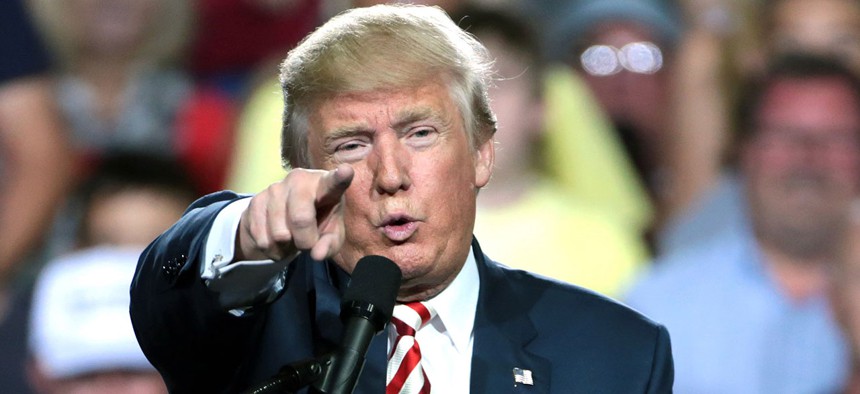
Flickr user Gage Skidmore
What It’s Like to Work at the Department of Energy as Donald Trump Takes Over
Employees are unsettled as the president-elect prepares to take office.
The Department of Energy is in turmoil as US president-elect Donald Trump’s team moves in to take over.
Why? The DOE, mainly responsible for American nuclear programs, is one of the most scientifically driven organizations in government. Its national research labs employ more than 100,000 scientists and engineers; its work also supports the development of clean-energy sources.
The new administration, however, has shown little interest in science. During the campaign, Trump called climate change a hoax and bobbled questions on nuclear policy. The last two secretaries of energy have held doctorates in hard science; Trump’s intended nominee is former Texas governor Rick Perry, who famously forgot that he wanted to eliminate the agency during an abortive presidential run in 2012.
The transition team sent by the Trump administration is led by staffers from the Institute for Energy Research, a nonprofit funded by Exxon and by Koch Industries, the petroleum conglomerate, to battle environmental rules or policies that benefit renewable energy over fossil fuels. The landing team distributed a questionnaire to the department’s staff asking which individuals worked on climate-change policy, attended scientific conferences on the topic, or even were members of scientific organizations that recognize the existence of climate change.
“Our career staff is made up of scientists and engineers who follow the science as part of their daily jobs,” says a senior DOE employee who asked to remain anonymous due to the sensitivity of the transition. “And what they see on the horizon here is doing that exact thing, following the science, could lead to repercussions on their livelihood.”
The DOE refused to share individual names with the transition. Now, Trump’s team said in a statement that “the questionnaire was not authorized or part of our standard protocol. The person who sent it has been properly counseled.”
“Not good enough,” the DOE official says. “They should dismiss the person who was responsible for the questionnaire.”
Perry has a short period to attempt to win over an unsettled staff, which doesn’t have a great opinion of his readiness for the role given his frequent calls to shutter the department.
“Presumably he’s coming here to lead the organization and not shut it down,” the anonymous staffer says. “Or he can choose to sort of dismantle the agency and diminish our standing as a global leader in innovation, and hurt US companies’ chances in the huge and growing clean energy market. He can make that choice really clear by immediately removing the transition teams that created this mess and created this climate of fear.”
Beyond the personal concerns of scientists who don’t want to be punished for doing their jobs, the transition process so far has made clear that major cuts are coming for clean energy programs. The questions asked which programs, jobs, and standards are mandated by law rather than implemented by political appointees. The transition team is also seeking to separate applied research programs, which are intended to lead to clean energy technology, from broader basic science programs.
“We have a consensus around the country, among scientists and scientific societies, that we need to massively increase the spending that we are doing here to make sure America keeps its competitive edge,” the staffer says, ruefully. “They are asking us to come up with lists of things they are planning on cutting.”
In past budget proposals, Republicans aimed to cut funding for renewable energy programs, but were deterred by the Obama administration. DOE staffers say if such cuts were enacted under the Trump administration, it would mean significant layoffs in agency’s Office of Energy Efficiency and Renewable Energy, which researches alternative energy sources like tidal and geothermal power, and saves consumers money by pushing for more energy-efficient vehicles and appliances.
Efforts to cut investment in renewable energy, while no doubt pleasing to the major oil companies that are politically close to Trump, may not sit well with Republican voters. A poll taken this summer by Pew showed that more than 80 percent of Americans backed expansions of wind and solar power.
During his transition in 2008, Obama promised “once again put science at the top of our agenda,” telling voters that “promoting science isn’t just about providing resources—it’s about protecting free and open inquiry. It’s about ensuring that facts and evidence are never twisted or obscured by politics or ideology.”
If the Trump administration makes good on the threats that energy officials now see to their agency, says the DoE staffer, “in four years people might have to make that same promise again.”
(Image via Flickr user Gage Skidmore)







